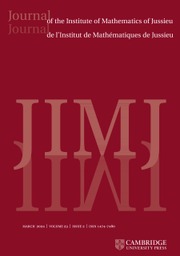Article contents
De Branges’ theorem on approximation problems of Bernstein type
Published online by Cambridge University Press: 27 February 2013
Abstract
The Bernstein approximation problem is to determine whether or not the space of all polynomials is dense in a given weighted  ${C}_{0} $-space on the real line. A theorem of de Branges characterizes non-density by existence of an entire function of Krein class being related with the weight in a certain way. An analogous result holds true for weighted sup-norm approximation by entire functions of exponential type at most
${C}_{0} $-space on the real line. A theorem of de Branges characterizes non-density by existence of an entire function of Krein class being related with the weight in a certain way. An analogous result holds true for weighted sup-norm approximation by entire functions of exponential type at most  $\tau $ and bounded on the real axis (
$\tau $ and bounded on the real axis ( $\tau \gt 0$ fixed).
$\tau \gt 0$ fixed).
We consider approximation in weighted  ${C}_{0} $-spaces by functions belonging to a prescribed subspace of entire functions which is solely assumed to be invariant under division of zeros and passing from
${C}_{0} $-spaces by functions belonging to a prescribed subspace of entire functions which is solely assumed to be invariant under division of zeros and passing from  $F(z)$ to
$F(z)$ to  $ \overline{F( \overline{z} )} $, and establish the precise analogue of de Branges’ theorem. For the proof we follow the lines of de Branges’ original proof, and employ some results of Pitt.
$ \overline{F( \overline{z} )} $, and establish the precise analogue of de Branges’ theorem. For the proof we follow the lines of de Branges’ original proof, and employ some results of Pitt.
- Type
- Research Article
- Information
- Journal of the Institute of Mathematics of Jussieu , Volume 12 , Issue 4 , October 2013 , pp. 879 - 899
- Copyright
- ©Cambridge University Press 2013
References
- 1
- Cited by




